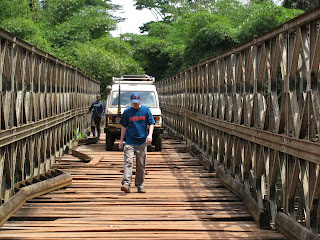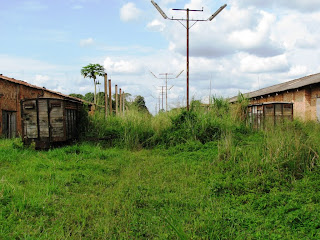The reality of working in Africa can be quite difficult. There is a steep learning curve, it can be challenging and exhausting. I remember, back in Manchester a few months ago, I was talking with family and some close friends, how I needed a fresh challenge, that God was calling me to something new, away from a secure, comfortable, happy environment at home to something more unknown in Africa.
mmm..be careful what you pray for? No Im joking, so far I`ve loved every minute of my time with Medair in the Congo. Through the ups and the downs, I have a great sense that im in the right place and God is really at work. There are definately challenges to working in this part of the world though. I am enjoying being stretched in many different directions.
The strongholds of poverty and dependency can mean that a lot of poeple are out for something. When they see a white face, they see dollar signs. You have to be very careful about you present yourself and the organisation you work for. Its very easy, with a Western mindset, to see the material needs here....money, clothes, school fees etc. There is a huge danger of setting a precedent if you decide to give some support to one individual. Even letting somebody use your internet can cause problems...before you know it you have the entire community asking if they can use your computer, at all times of the day. Its almost expected. Knowing how to manage these expectations is a skill I am still learning.
Then there is the problem of corruption. Its endemic in Congolese culture. Mobuto, when he was in power, said in a national newspaper "If you want to steal, steal a little in a nice way. But if you steal too much to become rich overnight, you'll be caught.". Mobutu was a notoriously corrupt leader, rumoured to have stolen over $5bn. There is a natural level of mistrust and suspicion in Congolese culture. Meeting with Congolese customs officials in recent weeks has been a testing experience. Naturally, the office in Isiro seems to have made up its own rules, they are completely different to the rules employed in Kinshsasa. We had a tricky situation, trying to prevent some of our motorbikes being impounded. We managed to negotiaite our way out of it, with some prayer and divine intervention helping us on our way. They really wanted us to pay the fines more than anything else, despite the fact that that we are a humanitairan organisation here to help the Congolese. Also our motorbikes are pretty important as our medical supervisors use them to get out to the field. Aarghh!!!
Managing Congolese staff can be challenging. Proactivity, initiative, planning, all key activities in Western organisations, are ofthen skils that are missing here. These are, of course, generalisations but management skills, especially when managing projects, seem to be a particular area where we can really develop capacity. Timetables, schedules, deadlines are not really followed. Communication can be frustrating as well, especially when you have staff based in several locations. There is a real opportunity for capacity building here
Im loving all the challenges so far though, and I still have lots to learn. Its a steep learning experience, no doubt about that. I will be ready for my holiday, at the end of August. You certainly need the regular breaks when working out in the field.
 The road from Isiro to Wamba. Not exactly the M1. Its about 200km. It took us 11 hours.
The road from Isiro to Wamba. Not exactly the M1. Its about 200km. It took us 11 hours.





 Completed Farm Phases!
Completed Farm Phases!














 One of the train carriages, in the old maintenance warehouse
One of the train carriages, in the old maintenance warehouse Some of the old machinery sat in the workshop. Apparently still in resonable condition, but it cannot be used because there is no power or fuel. The guy with me used to work at the station, since 1972 so he told me. They have not been paid for years, but him and few others turn up every day to guard the equiment and show people like us around. Can`t imagine there are many visitors. I have to say i don`t understand why they turn up everday. He told me they went on strike a few years ago but they were completely ignored, so eventually they just came back, presumably as they were unable to find jobs anywhere else. Maybe they have some blind hope it will be restored one day. Crazy!!!
Some of the old machinery sat in the workshop. Apparently still in resonable condition, but it cannot be used because there is no power or fuel. The guy with me used to work at the station, since 1972 so he told me. They have not been paid for years, but him and few others turn up every day to guard the equiment and show people like us around. Can`t imagine there are many visitors. I have to say i don`t understand why they turn up everday. He told me they went on strike a few years ago but they were completely ignored, so eventually they just came back, presumably as they were unable to find jobs anywhere else. Maybe they have some blind hope it will be restored one day. Crazy!!! I think this was a generator. Now just left there, never used. What a waste!!!
I think this was a generator. Now just left there, never used. What a waste!!! More transportation. Burnt out and left to rot. In the grounds of the station.
More transportation. Burnt out and left to rot. In the grounds of the station.
 One of the old buildings still standing at the station. 1000 employees used to work here apparently, they exported coffee, soap, fruit all over the Congo.
One of the old buildings still standing at the station. 1000 employees used to work here apparently, they exported coffee, soap, fruit all over the Congo. 










